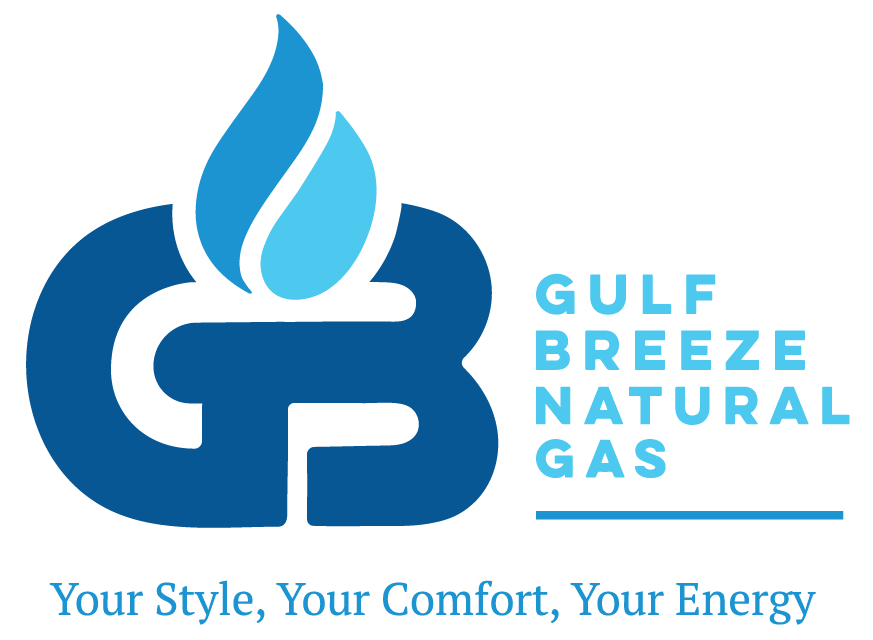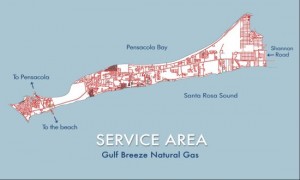How long has GBNG been in business?
Since 1964, the City of Gulf Breeze has provided Natural Gas service to our local community.
What area does GBNG service?
Our service map covers the Gulf Breeze peninsula, stretching from south of the Pensacola Bay Bridge along Hwy 98 to Holley By the Sea in Navarre.
We are also proud to be the Natural Gas provider to all of Pensacola Beach! In the event your home, neighborhood, or business are not already located close to a gas main line, our team will survey the area to see what can be done to extend future service to your location.
What is the mission of GBNG?
To provide safe, clean, efficient, reliable energy to our customers at the lowest cost. Gulf Breeze Natural Gas also maintains an excellent safety record. The utility continues to pass Florida Public Service Commission safety inspections without violations.
What is natural gas?
Natural gas is a colorless, odorless fuel that is also known as methane. Because natural gas is cleaner-burning than many other traditional fossil fuels, it is very earth-friendly.
Who uses natural gas?
According to the U. S. Department of Energy, nearly 70 million U. S. households (58% of all households) were using natural gas as of 2015 when the last national household energy survey was conducted. The majority of new single-family homes built in the U.S. are natural gas homes. Sixty million households were using natural gas for space heating, 56 million for water heating, and 39 million for cooking.
Gulf Breeze Natural Gas serves over 4,000 households and over 200 businesses.
How do I get natural gas service for my home?
Just call Customer Service at 934-5108 or fill complete the online Service Availability Application. The process is simple, and we will be glad to get it started for you. Read more about Connecting to Gas.
How much does natural gas service cost in Gulf Breeze?
Natural gas is a commodity, based on supply and demand, so natural gas prices fluctuate. And some households use more gas than others, depending on the size of the house and how well insulated it is and depending on how many live in the house.
The following figures represent actual utility bills paid by a Gulf Breeze Natural Gas customer in 2018.
Residence details
Single story, two adults, 1628 sq. ft.
Natural gas equipment and appliances
Heating system, water heater, cooktop and
oven
Highest month bill
$ 121.39* (January 2018)
Lowest month bill
$ 16.98** (August 2018)
* Includes $7.00 base charge (minimum monthly charge)
** Includes $10.00 low usage charge
Note: Natural gas rates fluctuate based on the actual market cost of natural gas. The dollar figures above represent an average rate and do not include utility tax.
Is there a minimum charge for gas service?
Yes. The minimum monthly charge is $ 7.00 within the City limits, $ 9.00 outside the City limits, or $10.00 for low usage.
Why should I heat my home with natural gas?
Even here on the Gulf Coast we can have some cold temperatures during our moderate winters. And when you are cold, you want to warm up fast. Natural gas heat is delivered at 110 to 120 degrees, about 25 degrees hotter than an electric heat pump. Natural Gas furnaces also last longer than heat pumps. The advantage is that Natural Gas heat is more efficient and more affordable.
If natural gas is odorless, what does that odor around natural gas come from?
The odor comes from a chemical which is added to the natural gas so that customers can tell when a natural gas appliance has been left on accidentally and they can detect a leak if it occurs.
What should I do if I smell gas in or around my house?
Visit our Safety Guide page for guidelines.
Where does natural gas come from?
Nearly all (99%) of the natural gas that America uses comes from North America. Natural gas is produced by drilling into the earth’s crust where vast pockets of natural gas were trapped hundreds of thousands of years ago. Once the gas is brought to the surface, it is refined to remove impurities. Then it is transmitted through major pipelines to distributors and to utilities like Gulf Breeze Natural Gas.
Where does Gulf Breeze Natural Gas get its gas from?
Nearly all of the natural gas delivered by Gulf Breeze Natural Gas comes from refineries in Louisiana and Alabama, supplied by natural gas wells on the Gulf Coast.
How many ways can natural gas be used in the home?
We have discovered as many as 16 different equipment applications for natural gas in the home: Heating systems, water heaters, cooktops, ovens, clothes dryers, whole-house generators, landscape lighting, decorative porch lights, spa and pool heaters, outdoor grills, patio torch lights for summer insect control, patio heaters, fireplaces, garage space heaters, towel warmers, and radiant floor warming systems.
What makes natural gas water heaters better?
Natural gas water heaters deliver a 30% higher First Hour Rating (FHR) than electric water heaters. That means you get 30% more hot water per hour when starting with a full tank. Thanks to faster heat recovery and better heat distribution, natural gas keeps you in plenty of hot water!
What about hydronic heating systems?
Hydronic heating systems fueled by natural gas combine water heating and whole-house heating in one system. These are often the most efficient of the natural gas systems.
Are there really any advantages to a natural gas clothes dryer?
Absolutely! Natural gas clothes dryers supply a moist heat, which is far gentler to your clothes than the dry heat of electric dryers. Natural gas drying is also faster; clothes last longer because they spend less time getting beaten up in a rotating drum. A natural gas clothes dryer can last 10 years longer than an electric dryer.
Whole-house natural gas generators are expensive. Are they worth it?
This is both a pocketbook and a lifestyle comfort decision. Just think back to the last time you lived in your home with no power for a week, two weeks, four weeks…..in the heat and humidity of July or August…..waiting in lines for enough gasoline to fuel a noisy little generator for maybe a day and just enough to keep your refrigerator going along with a couple of fans and lights. With a natural gas generator, those experiences will be a thing of the past.

